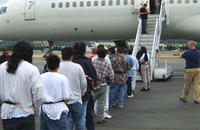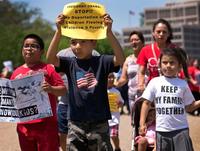-
Obama’s executive action may divert resources from handling legal immigrants

Critics of President Barack Obama’s executive order on immigration are worried that shifting immigration resources from work done on behalf of legal immigrants to applications filed by those in the country illegally would discourage future immigrants from entering the United States legally.A former federal immigration official compares the new immigration effort to the 2012 Deferred Action for Childhood Arrival program (DACA), which drew more than 600,000 applications from Dreamers.One of the effects of DACA was an increase in the wait time for green cards for immigrant spouses of U.S. citizens from five months to fifteen months, which critics blame on personnel being diverted to work on the DACA program.
-
-
Number of unaccompanied children crossing into U.S. declines sharply

The number of unaccompanied children apprehended by federal agents along the U.S.-Mexico border last October was down by 40 percent compared with October 2013. In the nine sectors of the Southwest border from California to Texas, federal border officials apprehended 2,529 children last October, down from 4,181 in October 2013. Family apprehensions also decreased about 10 percent — from 2,414 in October 2013 to 2,163 in October 2014.
-
-
Immigration advocates say CBP uses "expedited removal" to deport asylum seekers

A new complaint to the DHS Office of Civil Rights and Civil Liberties charge sthat U.S. Customs and Border Protection(CBP) agents routinely ignore asylum seekers’ claim of fear of prosecution in their homeland, a claim which could grant them asylum in the United States. The complaint further states that CBP officers are increasingly using “expedited removal” to deport illegal immigrants. Unlike conventional deportation, expedited removal occurs outside of the judicial process. The number of expedited removal orders more than doubled in less than a decade from 72,911 in 2005 to 193,092 in 2013.
-
-
Immigration hearings hampered by remote technology glitches, raising constitutional issues
The are currently nearly 400,000 pending deportation cases, shared among just 230 immigration judges in fifty-nine courtrooms. Immigration cases in the southern United States are encountering increasing delays and hardships due to the necessity of having to rely on wireless and mobile technology in order to have proper communication in the courtroom. Some even worry that the problems with the systems in place, including interpreters using teleconference equipment to translate large statements at a time, may be used in appeals on grounds that it is unconstitutional.
-
-
Obama’s executive order has been postponed, but U.S. deportation rate has already dropped
Earlier this year, President Barack Obama announced plans to act without congressional support to slow deportations, but he has now postponed any major changes to immigration enforcement until after November’s elections. U.S. Immigration and Customs Enforcementhas deported 258,608 immigrants between the start of the fiscal year 2014 (1 October 2013) and 28 July 2014, a 20 percent decrease from the same period in fiscal 2013, when 320,167 immigrants were sent back to their home countries.
-
-
Child in immigrant detention facility discovered to be U.S. citizen
In Tuscon, Arizona an 11-year-old boy — just one of the hundreds of children that have been detained at a detention facility in Artesia, New Mexico — was released because he was discovered by his attorney to be a U.S. citizen. The case has highlighted the hazards and potential mistakes that can befall DHS and Department of Justice (DOJ) officials when they choose to “fast-track” immigration cases.
-
-
To stem flow of minors, U.S. goes after human traffickers’ finances
Many of the 57,000 Central American minors who have crossed the Southwest border since October 2013 did so with the help of smugglers operating as part of a human trafficking network. To bring down these networks, federal agents from DHS and the Treasury Department’s Financial Crimes Enforcement Network(FinCEN) are reviewing suspicious bank transactions at U.S. banks, specifically accounts that are experiencing a sudden surge in transfers to Mexico.
-
-
Wave of illegal children immigrants shifts debate on use of executive powers

After several immigration bills stalled in Congress, President Barack Obama, in 2012 and 2013, issued a series of executive orders to limit the number of deportations of illegal immigrants. Many who advocated a tougher stance on immigration have charged Obama with failure to consult with Congress. The Obama administration is now trying to find a way to deport Central American illegal immigrants, many of them unaccompanied children, without running afoul of a George W. Bush 2008 law which makes such deportation difficult – and some of his immigration criticswant him to take executive action on the issue, a shift from their usual criticism that he has abused his executive powers.
-
-
U.S. recalibrating Secure Communities
The number of municipalities cooperating with Secure Communities has grown from fourteen in 2008 to more than 3,000 today, and about 283,000 immigrants have been deported under the program between 2008 and April of this year. More and more municipalities, however, refuse to hold undocumented immigrants in jail on behalf of Secure Communities.DHS chief Jeh Johnsonsays Secure Communities needs a “fresh start,”and President Barack Obama is planning to limit deportations to undocumented immigrants who have been convicted of violent crimes.
-
-
DHS mulling deportation policy changes
As part of an ongoing review of immigration deportation policies, DHS secretary Jeh Johnson is considering limiting deportations of undocumented immigrants who do not have serious criminal records. If adopted, the new policy would affect tens of thousands of immigrants who could have been deported because they committed repeat immigration violations such as re-entering the country illegally after being deported, failing to follow deportation orders, or missing an immigration court date.
-
-
Number of undocumented immigrants deported for minor offenses quadrupled
The Obama administration has dramatically increased the number undocumented immigrants being deported for minor offenses. Figures obtained by the New York Times through a Freedom of Information Act show a four-fold increase in deportations. Two-thirds of the nearly two million deportation cases the NYT studied involved people who had committed minor infractions or had no criminal record. The number of cases relating to people whose most serious offence was a traffic violation has quadrupled, rising from 43,000 over the last five years of George W Bush’s presidency to 193,000 since Obama took office.
-
-
Critics: administration does not deport deportation-eligible undocumented immigrants
A recent report by the Center for Immigration Studies(CIS), a Washington, D.C. nonprofit calling for more restrictive immigration policies, says that in 2013, U.S. Immigration and Customs Enforcement (ICE) deported fewer than 195,000 illegal immigrants despite receiving more than 720,000 notices on immigrants who could be eligible for deportation. Moreover, 68,000 immigrants released from pending deportation cases had criminal convictions on their records, the report stated. Pro-immigration advocates say the figures are misleading. “CIS is essentially asserting that a legal-permanent resident or a recently naturalized citizen with a broken tail light should be charged by ICE and removed from the country although there is no basis in law for such action,” said Benjamin Johnson of the American Immigration Council.
-
-
Debate intensifies over Obama deportation instruction to ICE
President Barack Obama’s recent instruction to DHS to find “more humane” ways to deport illegal immigrants has sparked yet another debate between immigration supporters and critics as to what exactly Obama’s directive meant. Supporters of undocumented immigrants hope DHS will cease all deportations deemed unnecessary, while opponents of Obama’s immigration policies urge DHS to carry out the country’s immigration laws as written by Congress.
-
-
White House to reassess deportation policy internally
President Barack Obama, after his meeting with key Latino leaders last Friday to discuss further implementation of reform under current law, has announced that the administration will take another look into current deportation policies.
-
-
Secure Communities triggers deportation of undocumented immigrants with no criminal records
The U.S. Immigration and Customs Enforcement’s (ICE) Secure Communitiesprogram sends fingerprint data from local law enforcement and the Federal Bureau of Investigationto immigration officers to identify and deport illegal immigrants who commit major crimes. The program has expanded from fourteen jurisdictions in 2008 to more than 3,000 today. Immigration advocates say that the program’s emphasis on identifying and deporting undocumented immigrants who have committed crimes in the United States notwithstanding, it has also triggered the deportation of 5,964 undocumented immigrants with no criminal records.
-
- All
- Regional
- Water
- Biometrics
- Borders/Immig
- Business
- Cybersecurity
- Detection
- Disasters
- Government
- Infrastructure
- International
- Public health
- Public Safety
- Communication interoperabillity
- Emergency services
- Emergency medical services
- Fire
- First response
- IEDs
- Law Enforcement
- Law Enforcement Technology
- Military technology
- Nonlethal weapons
- Nuclear weapons
- Personal protection equipment
- Police
- Notification /alert systems
- Situational awareness
- Weapons systems
- Sci-Tech
- Sector Reports
- Surveillance
- Transportation
Advertising & Marketing: advertise@newswirepubs.com
Editorial: editor@newswirepubs.com
General: info@newswirepubs.com
2010-2011 © News Wire Publications, LLC News Wire Publications, LLC
220 Old Country Road | Suite 200 | Mineola | New York | 11501
Permissions and Policies
Editorial: editor@newswirepubs.com
General: info@newswirepubs.com
2010-2011 © News Wire Publications, LLC News Wire Publications, LLC
220 Old Country Road | Suite 200 | Mineola | New York | 11501
Permissions and Policies
